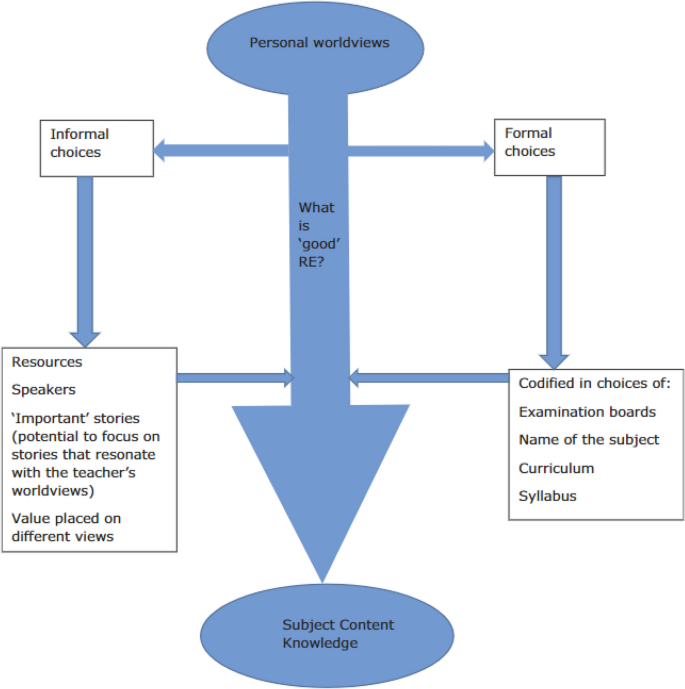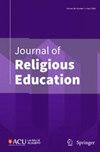Implementing Personal Construct Theory to explore divergent approaches to substantive knowledge in RE
IF 0.8
0 RELIGION
引用次数: 0
Abstract
Abstract Divergence is not a new phenomenon in RE in England and Wales. A diverse range of aims and approaches have been promoted since RE provision became compulsory in 1944. Approaches include the phenomenological, interpretative, and dialogic with current debates centring around the benefits and challenges of a ‘worldviews approach’. There have been a range of responses to this approach, and implementation has been diverse. It may appear that at the heart of this divergence is confusion over the definition of the term 'worldview' and what this entails for teachers: adding content knowledge and diverse sources. However, this paper argues that the divergence is much more significantly rooted in the nature of ‘substantive knowledge’ and the power dynamics associated with who defines, selects and assesses the validity of substantive knowledge. In current research, I am testing the hypothesis that teachers’ personal worldviews influence their choice of substantive knowledge in RE. Through 142 questionnaires and 21 interviews, this power dynamic is being investigated. Employing Kelly’s (Kelly, Personal construct psychology, Norton, 1955) Personal Construct Theory illuminated teachers’ personal worldviews relating to substantive knowledge in RE. Through the completion and analysis of RepGrids, the teachers revealed they taught the ‘good’ aspects of religions and ignored the ‘bad’. They prized knowledge from lived experience above knowledge provided by religious institutions and some deemed online sources more useful than those from religious institutions. The power to define ‘substantive’ knowledge, once primarily in the hands of religious institutions, has dissipated to embrace definitions from teachers’ personal worldviews. Whilst enabling a diversity of beliefs to be covered, without examination, hegemonic power may risk the validity of the subject. What is needed, in the midst of this divergence, is not a battle for supremacy, and a rejection of one voice over the other, but an acknowledgement of the power dynamics in defining substantive knowledge in RE.

运用个人构念理论探索RE中实体知识的不同途径
在英格兰和威尔士的RE中,分化并不是一个新现象。自1944年强制提供可再生能源以来,促进了一系列不同的目标和方法。方法包括现象学、解释学和对话,目前围绕“世界观方法”的好处和挑战展开辩论。对这一方法有各种各样的反应,实施方式也各不相同。这种分歧的核心似乎是对“世界观”一词的定义的困惑,以及这对教师的要求:增加内容知识和多样化的资源。然而,本文认为,这种分歧更重要的根源在于“实质性知识”的本质,以及与谁定义、选择和评估实质性知识的有效性相关的权力动力学。在目前的研究中,我正在测试教师的个人世界观影响他们在RE中实质性知识选择的假设。通过142份问卷和21次访谈,我们正在调查这种权力动态。运用凯利的(凯利,个人构念心理学,诺顿,1955)个人构念理论阐明了教师在RE中与实质性知识相关的个人世界观。通过对RepGrids的完成和分析,教师们揭示了他们教授宗教的“好的”方面而忽略了“坏的”方面。他们更看重来自生活经验的知识,而不是宗教机构提供的知识,有些人认为在线资源比宗教机构提供的更有用。定义“实质性”知识的权力,曾经主要掌握在宗教机构手中,现在已经消散,接受了教师个人世界观的定义。在使信仰的多样性得以覆盖而不受审查的同时,霸权可能会危及主体的有效性。在这种分歧中,我们需要的不是一场争夺霸权的斗争,也不是对另一种声音的拒绝,而是承认在定义可再生能源的实质性知识时的权力动态。
本文章由计算机程序翻译,如有差异,请以英文原文为准。
求助全文
约1分钟内获得全文
求助全文
来源期刊

Journal of Religious Education
RELIGION-
自引率
50.00%
发文量
28
期刊介绍:
Journal of Religious Education is a refereed publication for the academic exploration of the task of religious education in modern society. The journal helps disseminate original writings and research in religious education and catechesis - particularly as it relates to the faith formation of children and young people. Articles for publication on religious education in various contexts and on related areas, as well as book reviews are welcome.
 求助内容:
求助内容: 应助结果提醒方式:
应助结果提醒方式:


